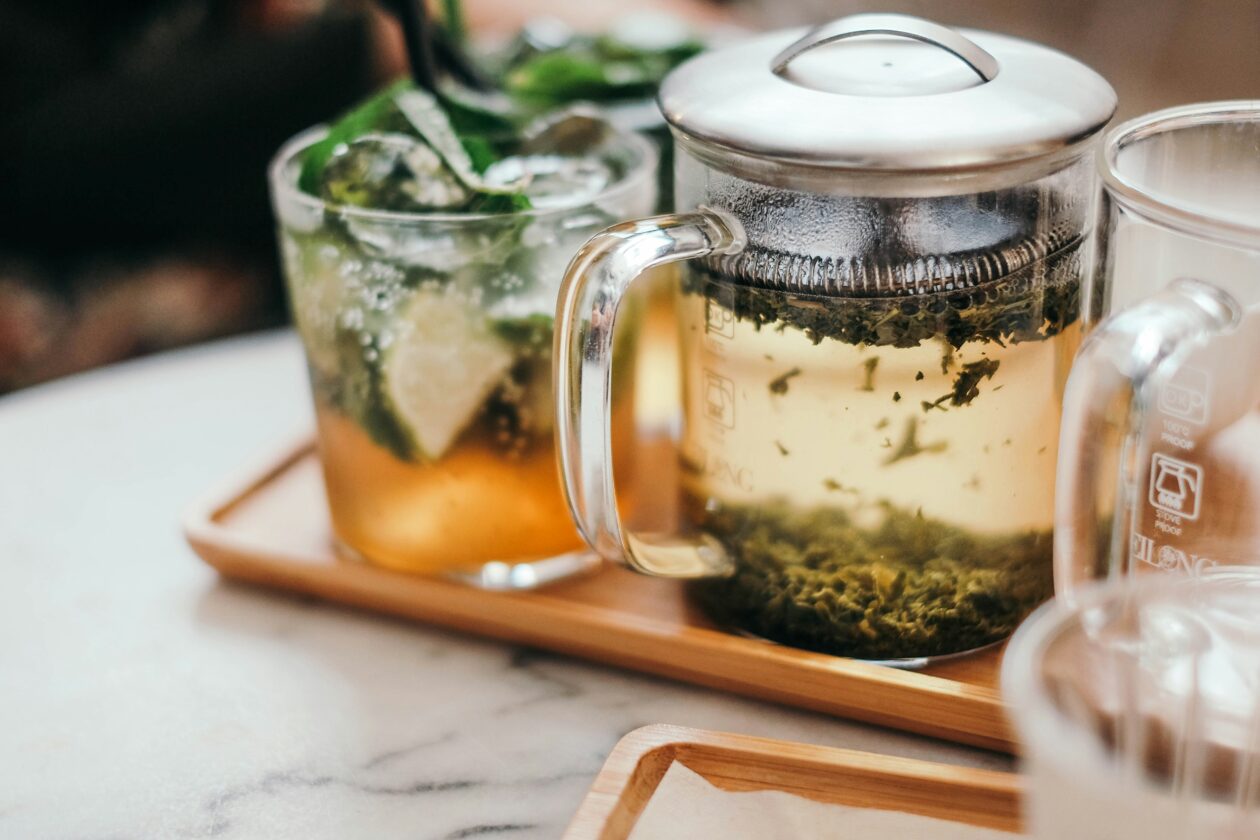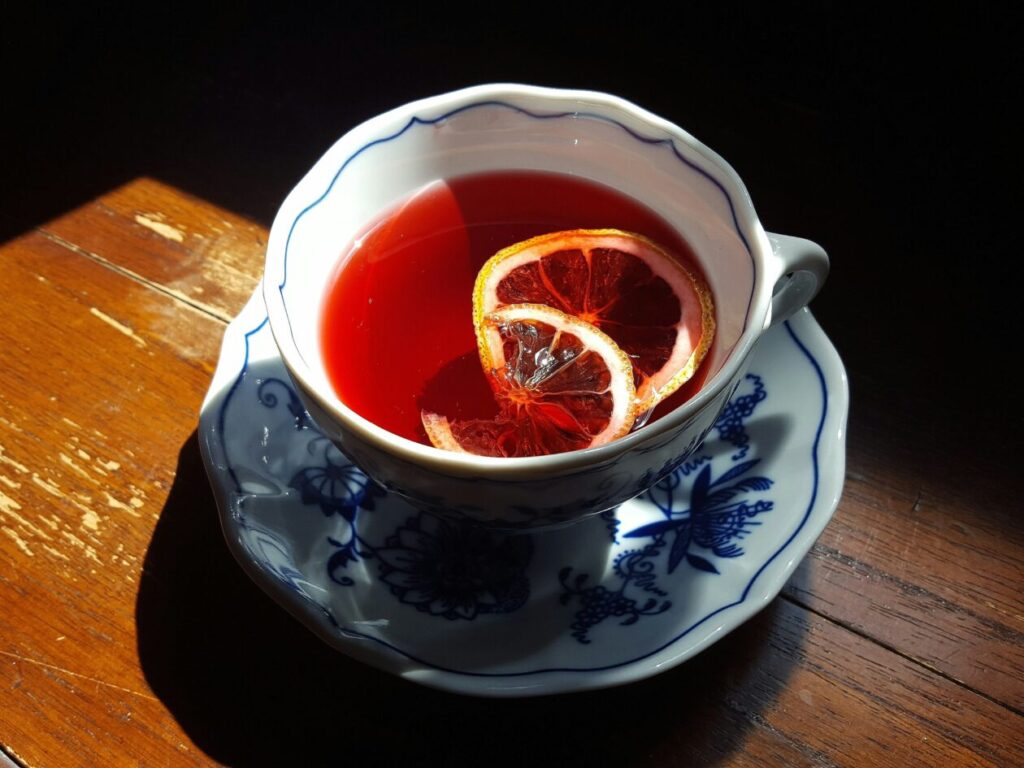Discover 7 Amazing Benefits of Lemongrass and Ginger Tea
 / Discover more like this here: https://stylevitally.com/benefits-of-lemongrass-and-ginger-tea/?feed_id=6485&_unique_id=663b7e9104963&utm_source=&utm_medium=ycfemb83&utm_campaign=FS%20Poster
/ Discover more like this here: https://stylevitally.com/benefits-of-lemongrass-and-ginger-tea/?feed_id=6485&_unique_id=663b7e9104963&utm_source=&utm_medium=ycfemb83&utm_campaign=FS%20Poster
Introduction
In addition to captivating the senses with its delicious blend, lemongrass and ginger tea has several health benefits. It is a lovely infusion. Ginger's warm, spicy overtones are expertly blended with the zesty, lemony notes of lemongrass to create this herbal tea. Famous for their unique tastes and healing qualities, lemongrass and ginger combine to create a harmonic blend that is more than just a drink. Exploring these herbs' rich cultural history and traditional applications becomes intriguing as we get further into the world of lemongrass and ginger tea. This investigation reveals the richness and importance of this fragrant mixture, emphasizing not only its sensory appeal and cultural significance but also the many benefits of lemongrass and ginger tea.
One of the main characteristics of lemongrass and ginger tea is its versatility, making it a drink fit for various tastes and situations. This tea easily adjusts to your mood and the weather, whether you choose a steaming cup to warm your senses on a chilly day or an iced version to battle the heat.
To get the strength and taste profile you want, you can experiment with steeping times and tea-to-water ratios during brewing, which is an artistic endeavor. Use the creative aspect of preparing tea by experimenting with different garnishes, such as a slice of lemon or a sprig of mint, to improve the overall sensory experience and appearance. Ginger and lemongrass tea's versatility goes well beyond its historical uses, allowing you to enjoy it in various ways.
Let's now explore the health advantages infused into every cup of ginger and lemongrass tea. By bringing out its inherent anti-inflammatory and antioxidant qualities, lemongrass infusion aids digestion and calms the stomach. Conversely, ginger is well known for its ability to strengthen the immune system and reduce nausea. These components produce a wellness powerhouse that provides a tasty drink and a whole-person well-being approach. As we begin our exploration of the health advantages of lemongrass and ginger tea, let's look at the scientific justifications for why this aromatic combination is becoming increasingly popular among fitness enthusiasts around the globe.
Benefits of Lemongrass and Ginger Tea

A. Lemongrass as a Detoxifying and Weight Loss Aid
Lemongrass tea is a popular option for people looking for a natural way to lose weight and detoxify. This fragrant beverage frequently served in Thai and Vietnamese restaurants, has gained popularity due to its ability to promote weight loss efforts and help with bodily cleansing. Beyond its use in cooking, lemongrass tea's reputation as a cleansing concoction is frequently reflected in spa settings, where fans take advantage of its energizing and renewing qualities.
- Common Use in Thai and Vietnamese Restaurants
Vietnamese and Thai cuisines also heavily include lemongrass tea in their recipes. The fact that these eateries frequently employ the infusion indicates that they value its possible health benefits and great flavor. Customers are drawn to the tea's flavors and may benefit from its purifying qualities because of its fragrant appeal and delicate citrus overtones.
B.Scientifically Supported Health Benefits
Not only is lemongrass tea delicious, but it also has health advantages that have been scientifically proven, which makes it a holistic option for wellness enthusiasts.
- Rich in Antioxidants
According to preliminary research, lemongrass is a high source of antioxidants, which can protect the body from oxidative stress. Antioxidants are essential for maintaining general health because they help shield cells from harm from free radicals.
- Therapeutic Effects: Antibacterial, Antidiarrheal, Antifungal, Anti-inflammatory
Lemongrass is known to have a variety of medicinal benefits, such as antimicrobial, antifungal, antidiarrheal, and anti-inflammatory qualities. Because of these properties, lemongrass tea has the potential to be an ally in promoting the body's immunological response and preserving digestive health.
- Anticancer Properties (Lab Studies)
Early laboratory studies suggest lemongrass may have anticancer properties, but additional research is required. Though lemongrass tea shouldn't be used in place of medical advice or therapies, these encouraging results raise questions about the tea's potential as a preventive strategy.
- Natural Diuretic and Aid in Bloating
Due to its inherent diuretic qualities, lemongrass tea has earned a reputation as a bloating and renal function supporter. Those trying to keep their bodies' fluid equilibrium may find this mild diuretic action helpful.
- Immune-Boosting Alliance with Ginger
Ginger boosts the immune-boosting properties of lemongrass tea even more. This partnership hopes to prevent common ailments and advance general health by strengthening the body's defenses.
- Holistic Approach to Wellness
Beyond just being a tasty drink, lemongrass and ginger tea have several health benefits, including lowering the risk of cancer, supporting heart health, easing nausea, enhancing cognitive function, controlling pain and inflammation, and helping to manage diabetes. Incorporating lemongrass tea into your regimen can be a tasty and aromatic step toward holistic well-being while still enjoying its rich aromas.
- Note on Citronella and Mosquito Repellent
In addition to its nutritional advantages, lemongrass contains citronella, a naturally occurring oil that deters mosquitoes. Although this isn't the main benefit of drinking lemongrass tea, this extra point illustrates how varied its benefits are.
C. Side Effects and Precautions
Blood Pressure Considerations
Those with blood pressure issues should be careful if they drink lemongrass tea. Despite being widely regarded as safe, its ability to reduce blood pressure could cause hypotension or interfere with medication interactions. For specific problems, it is best to speak with a healthcare provider.
Moderation in Consumption
Moderation is essential while using any herbal infusion. Although drinking too much lemongrass tea can have negative effects, it has many positive aspects. Keeping your use of lemongrass tea in check guarantees you reap its benefits without experiencing any negative side effects.
Ingredients and Recipe
Overview of Simple Ingredients
Making tea with ginger and lemongrass requires only a few powerful ingredients. Water, ginger, and fresh lemongrass are the main ingredients. This simple blend guarantees that you take advantage of the potential health advantages of these two strong substances and offers a delicious burst of flavor.
Tips on Obtaining Fresh Lemongrass
Getting fresh lemongrass is essential for the best ginger tea and lemongrass experience. Look for sturdy stalks with a distinct lemon aroma when choosing lemongrass. A vivid green hue and a firm texture indicate freshness. It's best to buy from reliable vendors or local marketplaces for the best quality.
Step-by-Step Instructions for Making Lemongrass and Ginger Tea
- Preparing Lemongrass and Ginger
First, remove the rough outer layers from the lemongrass stalks by washing and cutting them. Slice the ginger thinly after peeling it. The flavors that are released during the brewing process are enhanced by this preparation.
- Simmering Process
In a pot, combine the prepared ginger and lemongrass with water. Allow the ingredients to infuse the water by bringing the mixture to a slow simmer. Simmer until the flavors are well combined, 15 to 20 minutes.
- Sweetening Options
Investigate several choices for sweetening to make your tea unique. The zesty undertones of lemongrass are complemented by natural options like honey, agave, or a hint of stevia, which improve flavor without sacrificing health benefits.
Variations and Additional Recipes
Try these tempting varieties of lemongrass tea to broaden your palate:
- Lemongrass Green Tea
For a revitalizing blend, blend lemongrass and green tea leaves. This mix combines the zesty appeal of lemongrass with the health benefits of antioxidants found in green tea.
- Lemongrass Tea with Lime
Incorporate lime into your lemongrass tea to intensify the flavor. Lime and lemongrass work together to create a zesty, bright flavor profile that awakens the senses.
- Tropical Tea with Pandan Leaf
Stray into the tropics with your lemongrass tea by adding pandan leaf. With every sip, this unusual blend takes you to exotic landscapes with a pleasant, floral aroma.
- Indian Lemongrass Tea with Milk
Add a little milk to this lemongrass tea for an Indian-inspired taste. This pleasant, aromatic beverage with a dash of spice is made with lemongrass and creamy milk.
By experimenting with these versions, you can learn about the various facets of ginger tea and lemongrass that suit a range of palates and events.
Recipe FAQs
A. Addressing the Caffeine Content in Lemongrass Tea
When learning about the world of lemongrass and ginger tea, one frequently asked question is about the caffeine concentration. Since lemongrass tea is naturally caffeine-free, it provides a refreshing option for people who want a drink without any stimulants. But if you decide to blend ginger tea with lemongrass, you should know that the ginger will affect the amount of caffeine. The caffeine content of ginger tea is typically much lower than regular tea or coffee. You can tailor your tea to your tastes if you are sensitive to caffeine by choosing a caffeine-free ginger tea variety or varying the blend ratio.
B. Exploring Potential Additions Like Jasmine Tea
Fans of ginger and lemongrass tea frequently consider adding other ingredients to improve the flavor profile as a whole. The use of jasmine tea is one interesting choice. The fragrant and delicate note of this flowery tea tempers lemongrass's aggressiveness and ginger's spiciness. To accomplish this blend, make the ginger and lemongrass tea according to recipe instructions, and then steep a jasmine tea bag with it in the final moments of the brewing process. The ultimate product is a well-balanced combination that combines the graceful floral notes of jasmine with the earthy and zesty tones of lemongrass and ginger. Try several ratios until you find the ideal balance that suits your tastes.
Where to Buy Lemongrass

A. Accessibility at Asian Markets and Mainstream Grocery Stores
A vital component of the energizing lemongrass and ginger tea, lemongrass is widely accessible at various establishments to suit multiple tastes. Look into the produce department of your local Asian markets; fresh lemongrass is usually available there. The fragrant stalks, with their zesty appeal, are easy to obtain, making them a practical choice for individuals looking for real components.
Mainstream grocery stores have also seen the growing demand for dishes containing lemongrass, such as teas. Fresh lemongrass is now readily available in many stores, making it accessible to a wider range. The availability of lemongrass in these supermarkets demonstrates the herb's popular appeal. It makes it easy for people to use this wonderful herb in cooking, especially when brewing health-conscious lemongrass and ginger tea.
B. Options for Obtaining Dried Lemongrass
Dried lemongrass is a good substitute for people looking for something more portable and durable. Dried lemongrass can be found at specialty shops, health food stores, and online, enabling tea lovers to keep a supply on hand for extended periods. Dried lemongrass is a convenient option for people who only sometimes have access to fresh lemongrass because it keeps its unique citrus flavor and is simple to add to tea blends.
Select reliable vendors to ensure the dried lemongrass you get is high quality. This method ensures that the flavor and nutritional content of the product are maintained, which is in line to get the most out of your ginger and lemongrass tea. Tea lovers can enhance their tea-making experience by experimenting with different flavors and textures using fresh and dried lemongrass.
Expert Tips
A. Proper Handling of Tough Lemongrass Stalks
The key to getting the most out of lemongrass and ginger tea is learning how to handle the stiff stalks of lemongrass. Begin by choosing sturdy, fresh stalks that smell strongly of lemon and are bright green. Use the back of a knife to lightly crush the stalks or roll them between your hands to make them more malleable and easier to deal with. This easy method releases the essential oils, enhancing the tea's flavor. When slicing lemongrass for your drink, discard the upper green bits and concentrate on the lower, sensitive part of the stalk.
B. Creative Uses of Lemongrass in Disposable Tea Bags
Add lemongrass to single-use tea bags for an easy and mess-free brewing experience. Just cut the lemongrass into little pieces to fit snugly into the tea bag. To produce a blend that matches the sought-after advantages of lemongrass and ginger tea, combine these with slices of ginger or ginger tea leaves. This makes it easier to share and give your tea blends as gifts in addition to streamlining the brewing process. Because the tea bags are disposable, the ingredients remain fresh, making it a useful option for people who lead hectic lives.
C. Adding Turmeric for a Golden Hue
Add turmeric to your lemongrass and ginger tea to enhance its flavor and health benefits. Turmeric, which has a bright golden color and reduces inflammation, goes well with the spicy flavors of lemongrass and the warming effects of ginger. Add a small slice of turmeric or a quarter teaspoon of ground turmeric during the simmering phase. This adds another level of wellness to your tea while improving its appearance. You can adjust the turmeric amount to your tastes and achieve a visually appealing and tasty tea.
Lemongrass & Ginger Tea Product Spotlight
"Citrus Zing Blend" is a superb Lemongrass & Ginger Tea designed for people who want a burst of flavor. With each sip, the bright, zesty notes of lemongrass and the warm, spicy aroma of ginger harmoniously create a delicious tea. The blend, which comes from organic farms, ensures a natural and pure tea-drinking experience. Because the loose-leaf form preserves the purity of each ingredient, you can see the lovely dance of ginger and lemongrass as it unfolds in your cup. This tea is unique because of the thoughtful selection of these high-quality components, which ensures a cool and stimulating brew.
Discover Citrus Zing Blend's rich heritage and plant-powered goodness. The tea's characteristic lemon scent and possible health advantages come from using lemongrass, a common ingredient in Southeast Asian cuisine. Combined with ginger, which is well known for having anti-inflammatory qualities, this mixture provides a comprehensive approach to health. Tea contains many plant-based components, including antioxidants, which benefit general health. Every cup is an ode to nature's abundance, offering a delicious taste and a healthy dosage of traditional ingredients.
Beyond its delicious flavor, Citrus Zing Blend offers several possible health benefits. There is a reputation for lemongrass to help with digestion, which may help with bloating and indigestion. A tried-and-true treatment, ginger may help to lower inflammation and boost immunity. Together, lemongrass and ginger are potent combinations that taste good and promote overall health and well-being. Enjoy the advantages of Lemongrass & Ginger Tea and immerse yourself in the goodness of nature with every cup.
Benefits of Drinking Lemongrass Tea in the Morning

This refreshing drink is a great way to start your day because it has the aromatic scent of lemongrass and a hint of warmth from ginger. In addition to its delicious taste, lemongrass tea has been recognized for its possible health advantages, which makes it a great option for people looking for a nutritious way to start the day.
Particular Advantages for Morning Intake
- Detoxifying the Body: Lemongrass is well known for having detoxifying qualities, which may help the body eliminate impurities. Having a cup of lemongrass tea first thing in the morning will help you feel refreshed and invigorated throughout the day.
- Assisting Digestion: Take advantage of lemongrass tea's digestive advantages, especially first thing in the morning while your body prepares for the day. The tea might help support a healthy gut environment and ease indigestion.
Lemongrass and Ginger Tea Side Effects and Risks
Although there are many health advantages to drinking lemongrass and ginger tea, it's important to be aware of any possible adverse effects to achieve a balanced intake. People can better understand lemongrass tea by considering including it in their daily routine by addressing common questions.
Some people may react to lemongrass mildly allergic, causing skin irritation or respiratory distress. Before drinking the tea daily, it is best to do a patch test, particularly for people allergic to similar plants like lemon or citronella.
Furthermore, lemongrass tea may cause digestive problems, including upset stomach or diarrhea, if taken in excess. It's important to exercise moderation, and people with sensitive stomachs might find it helpful to start with lesser amounts.
Conclusion
Let's sum up by saying that lemongrass and ginger tea are a powerful combination of natural goodness with many advantages beyond simply being a nice cup of warming. Ginger and lemongrass combine to provide a delicious concoction that enhances general health and stimulates the senses.
With its zesty flavor, lemongrass revitalizes the tea, making it a perfect beverage for various settings. It has received praise for its antioxidant-rich composition, ability to help with weight loss, and cleansing qualities. By including digestive aids and anti-inflammatory properties, ginger enhances the health benefits.
Reference
An, S., Liu, G., Guo, X., An, Y., & Wang, R. (2019). Ginger extract enhances antioxidant ability and immunity of layers. Animal Nutrition, 5(4), 407–409. https://doi.org/10.1016/j.aninu.2019.05.003
Ekpenyong, C. E., Daniel, N. E., & Antai, A. B. (2015). Effect of Lemongrass Tea Consumption on Estimated Glomerular Filtration Rate and Creatinine Clearance Rate. Journal of Renal Nutrition, 25(1), 57–66. https://doi.org/10.1053/j.jrn.2014.08.005
Ruvinov, I., Nguyen, C., Scaria, B., Vegh, C., Zaitoon, O., Baskaran, K., Mehaidli, A., Nunes, M., & Pandey, S. (2019). Lemongrass Extract Possesses Potent Anticancer Activity Against Human Colon Cancers, Inhibits Tumorigenesis, Enhances Efficacy of FOLFOX, and Reduces Its Adverse Effects. Integrative Cancer Therapies, 18, 153473541988915-153473541988915. https://doi.org/10.1177/1534735419889150
Silva, Jung, W.-G., Hossain, S., S.H.M.P. Wimalasena, H. N. K. S. Pathirana, & Heo, G. (2017). Antimicrobial property of lemongrass (Cymbopogon citratus) oil against pathogenic bacteria isolated from pet turtles. Laboratory Animal Research, 33(2), 84–84. https://doi.org/10.5625/lar.2017.33.2.84
WebMD Editorial Contributors. (2020, October 7). Lemongrass: Are There Health Benefits? WebMD; WebMD. https://www.webmd.com/diet/lemongrass-health-benefits
https://stylevitally.com/benefits-of-lemongrass-and-ginger-tea/?feed_id=6485&_unique_id=663b7e9104963&utm_source=&utm_medium=ycfemb83&utm_campaign=FS%20Poster
Comments
Post a Comment